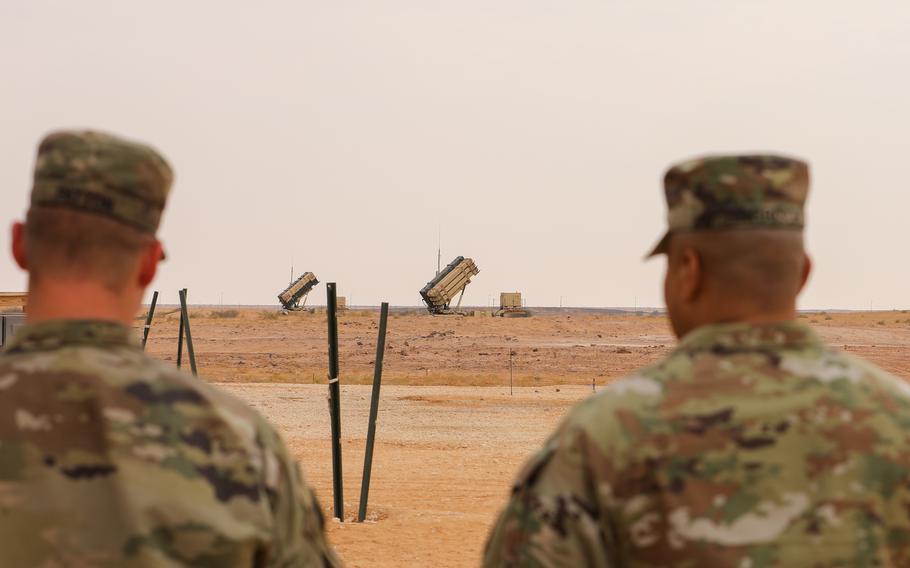
Brig. Gen. Richard Harrison, commanding general of 32nd Army Air and Missile Defense Command, observes Patriot launchers Nov. 19, 2023, at an undisclosed location in the Middle East. (Duy Nguyen/U.S. Army)
Capt. Joseph Remaniak feared one of his worst nightmares had become reality as sirens blared across al Asad Air Base in Iraq.
Troops rushed to bunkers and planes hastily lifted off the runway Jan. 20, minutes ahead of an incoming ballistic rocket attack.
“Truthfully, I thought we were about to take rounds to the face,” Remaniak, commander of Bravo Battery, 1st Battalion, 7th Air Defense Artillery Regiment, said in a recent interview. “I thought we were about to get impacted. Soldiers were probably going to die.”
The attack by an Iranian-backed militia, one of the largest against U.S. troops in the Middle East since Hamas attacked Israel on Oct. 7, left four American troops and one Iraqi soldier injured, U.S. Central Command said.
Most of the rockets were intercepted by the base’s air defense systems, but U.S. officials did not say how many. Soldiers in the battery said their Patriot missile system intercepted the threats deemed most likely to hit al Asad.
“Without us here, most of those missiles or rockets would have impacted the base and possibly killed a lot of people here,” said Sgt. Henry Prol, a Bravo Battery operator and maintainer on a Patriot missile launcher.
The battery’s actions that day mark a rare example in recent years of the almost 50-year-old anti-air weapon defending American troops overseas.

U.S. soldiers from Task Force Lightning Dagger posed for a photo Feb. 29, 2024, during a deployment to the Middle East. Soldiers with Bravo Battery of 1st Battalion, 7th Air Defense Artillery Regiment played a pivotal role recently in intercepting an attack on al Asad Air Base, Iraq. (Christopher Neu/U.S. Army)
The U.S. military rushed several Patriot batteries to the Middle East after the Israel-Hamas war began. The Israeli response to the Hamas attack led to dozens of strikes against U.S. troops in the region by militant groups angered by Western support for Israel.
Within 72 hours of receiving notice of their deployment, the troops of Bravo Battery and their Patriot systems had finished the journey from Fort Liberty in North Carolina to al Asad in Iraq, said Capt. Duy “Danny” Nguyen, a spokesman for the 31st Air Defense Artillery Brigade.
On Jan. 20, Spc. Joshkua Salazar was the first to notice rockets approaching on his radar screen. Within seconds, the soldiers verified the fast-moving objects they had detected.
“There was a window of only four to six seconds to posture the system to be able to engage,” Chief Warrant Officer 2 Kristopher Martin said, adding that Salazar manually engaged several of the incoming rockets.
Soldiers began hearing booming explosions echo across the base. “I thought we might’ve just taken an impact,” recalled Pfc. Tory Cenidoza, a battery crew member.
But the booms the soldiers heard were Patriot missiles launching and destroying incoming rockets mid-air, they recalled.
The strike was one of at least 184 attacks on U.S. troops in Iraq and Syria, a recent tally by the Washington Institute said.
The Jan. 20 strike involved at least 30 munitions, including large rockets. It was claimed by Islamic Resistance, an umbrella term for Iranian-backed militias in Iraq, according to a database compiled by the Washington Institute.
About a week after the attack on al Asad, a drone strike attack claimed the lives of three soldiers on Tower 22 in Jordan.
Since then, there has been a relative lull in attacks on U.S. troops. But U.S. officials say they are concerned about reprisal attacks on U.S. bases in the wake of an Israeli strike on two Iranian generals in Syria on April 1.
The soldiers with Bravo Battery said they are keeping themselves ready for whatever comes next, while being proud of their actions on Jan. 20.
“Ultimately, our soldiers courageously manned their battle stations and defeated the incoming aerial threat, saving certainly dozens of lives,” Remaniak said.